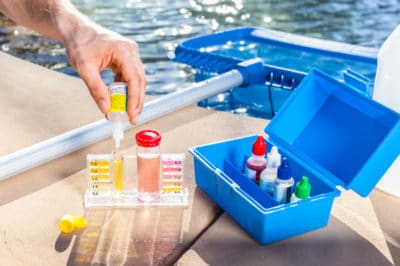What You Need to Know About the pH Balance of Your Pool
The ideal pH level that’s safe for swimming is between 7.2 and 7.8, the same range as our body’s pH level.
When your pool’s pH level goes over 7.8, it’s considered alkaline. High pH in the pool is dangerous for swimmers. Chlorine and other sanitizing chemicals won’t be able to do their job, and bacteria will flourish in your pool. The water will also become cloudy, and you’ll see scaling on the sides of your pool.
If your pool’s pH balance dips too low (under 7.0), then your pool will become acidic. This can cause skin irritation and burning eyes if you open them underwater. Water with low pH will also render chlorine and other chemicals ineffective. If you have a vinyl pool, the liner may wrinkle, and any metal in your pool can corrode.
When your water is too alkaline, it can also cause calcium hardness levels to increase, and you may have to get your pool acid-etched more often to keep it looking nice and clean.

What Causes the High pH in Swimming Pools?
Nature
The pH of your pool is going to change naturally, and this is to be expected. When your pool is just sitting there, carbon dioxide in the air will dissolve in the water, forming carbonic acid, lowering the pH. Swimming and splashing will break up that carbon dioxide and cause the pH to rise.
Algae also raise the pH because it consumes carbon dioxide. Left unchecked, algae can push the pH of your pool well over a safe level. But with ongoing maintenance from Premier Pool Service, your pool will never get to this point.
Pool Chemicals
Every type of pool chemical you use on your pool will affect the pH balance. Granulated or liquid chlorine will raise the pH, neutral sanitizers like Bromine have the slightest effect, and acidic cleaners like chlorine gas will lower the pH.
These chemicals are used in a few parts per million, and the change won’t be that drastic. It’s just something to keep in mind when trying to achieve balanced pool water yourself.
Chasing the perfect pH level can become frustrating if you’re not aware of the specific effect of the sanitizer you use.
Other Factors
A sudden temperature rise can cause the pH level to go up. Whether you warm it up with a pool heater or you experience a heatwave, this could cause it to spike.
One more thing to consider: if your pool has a new pebble or plaster finish, this will raise the pH. You don’t have to worry about this with fiberglass or vinyl.
Staying On Top of The pH Balance of Your Pool
For the chlorine to be most effective in your pool, you’ll want to keep your pool water balanced in the optimum range mentioned above. Here’s how you can stay on top of this.
When you’re in the middle of swim season and using your pool daily, consider testing daily.It’s recommended you test the chlorine twice a week, so if you’re already doing this, add pH testing into the mix.Debris and rainfall after inclement weather can also change the pH, so test after a storm.
The more acidic or alkaline your pool gets, the longer it will take to get the pH right. So heading off these problems will make sure your pool is soft, clean, and safe for you and your family to enjoy all year long.

Testing the pH Balance of Your Pool
Testing your pool’s pH and alkalinity level is relatively straightforward using strips and test kits.
Whether you go with dissolvable tablets or test strips, follow the instructions from the water testing kit manufacturer. Also, keep these tips in mind:
You’re looking for an optimal pH range between 7.2 and 7.6.Your total alkalinity should be between 80 ppm and 150 ppm.If your pH level is too high, use a mild acid to bring the alkalinity down.
Moving water will alter your sample, so take it from as closest to the middle of your pool as you can.
Things that can cause an inaccurate reading from your test:
Residual chlorine levelsBromineTaking a sample from near your jets
Leave it to the Pros
Having regular pool service is the best way to keep your pool ready whenever you need it. If any of this sounds too tedious, or you don’t want the hassle, we will gladly test for high pH levels and every other aspect of pool maintenance.
Contact Premier Pool Service today if you want to leave the pH balance of your pool up to professional, keeping your pool soft, safe, and clean all year long.